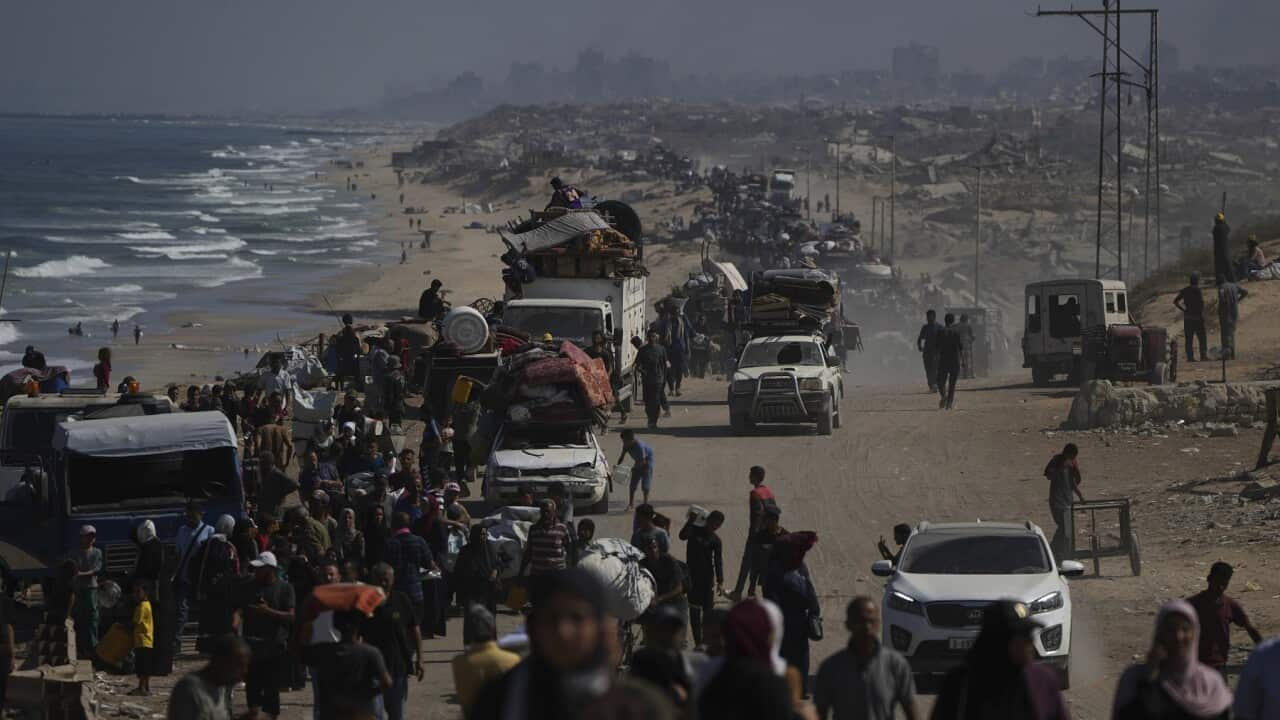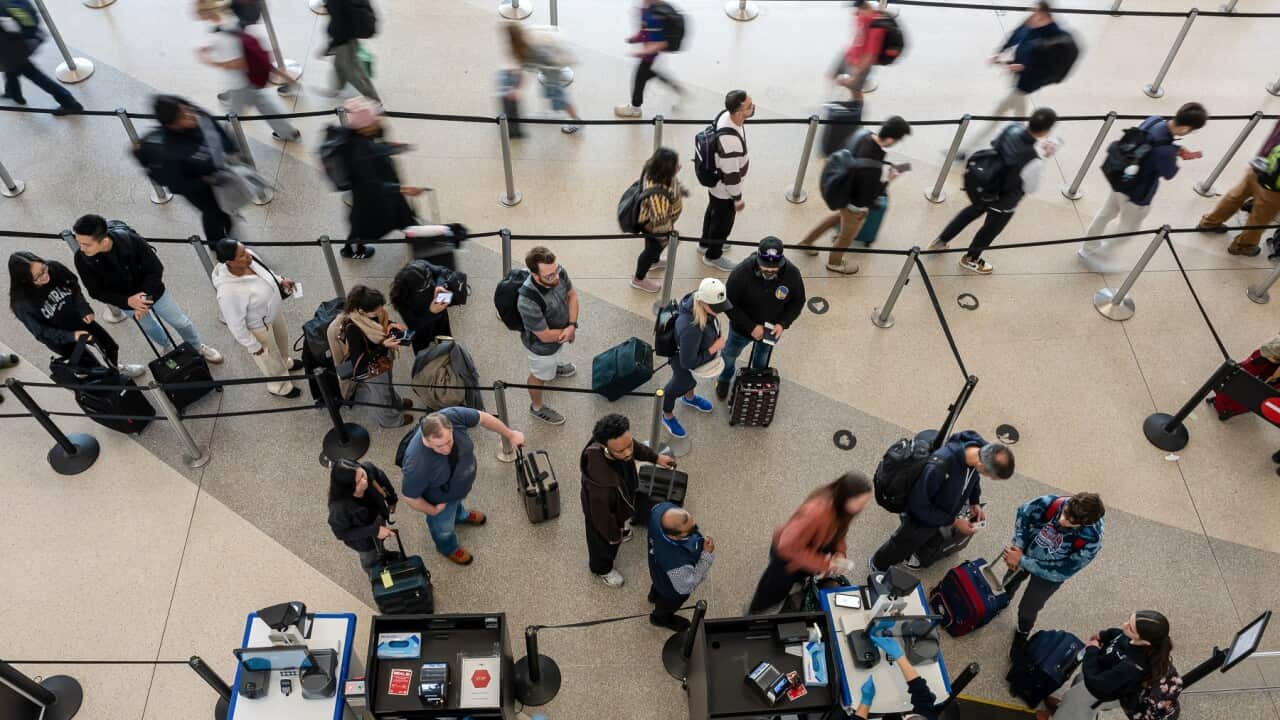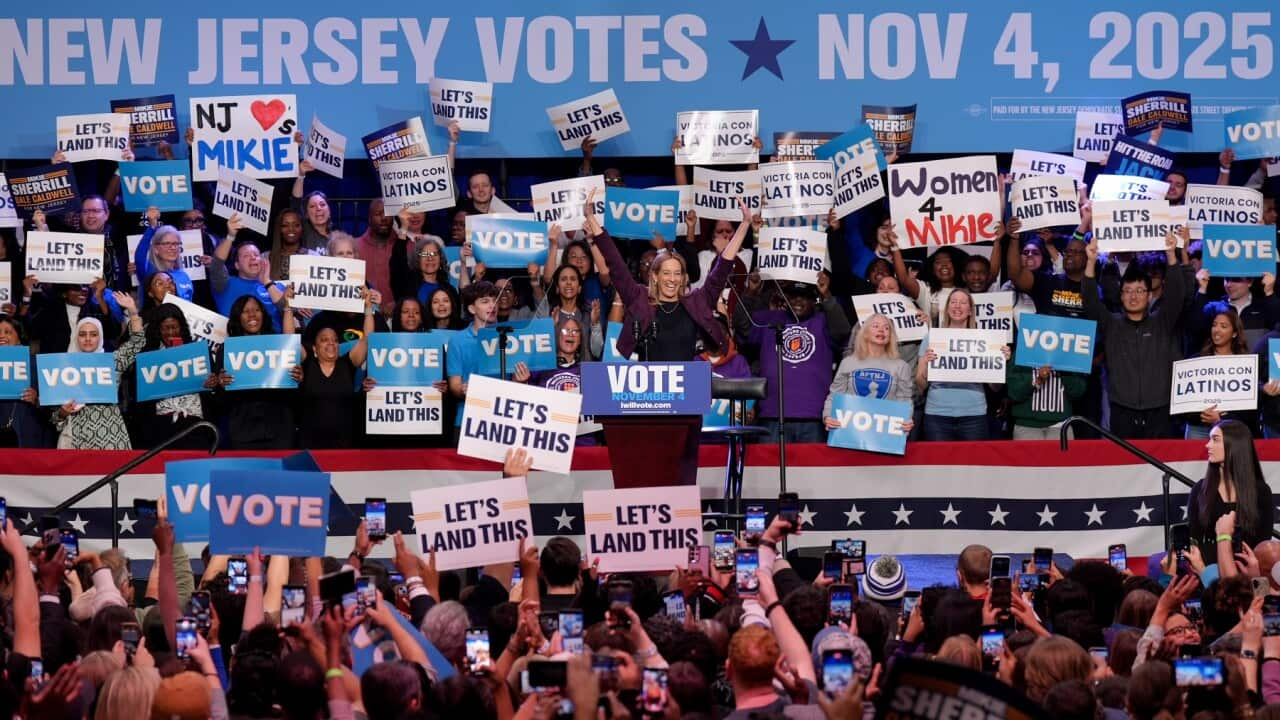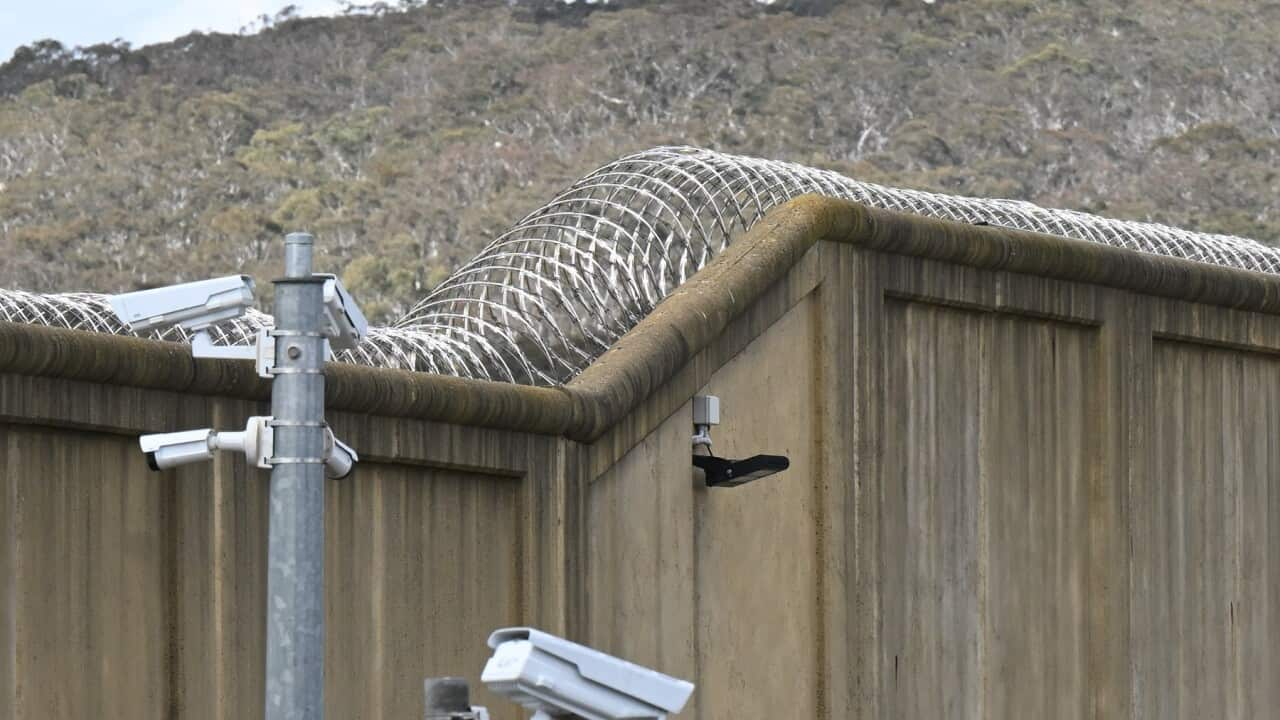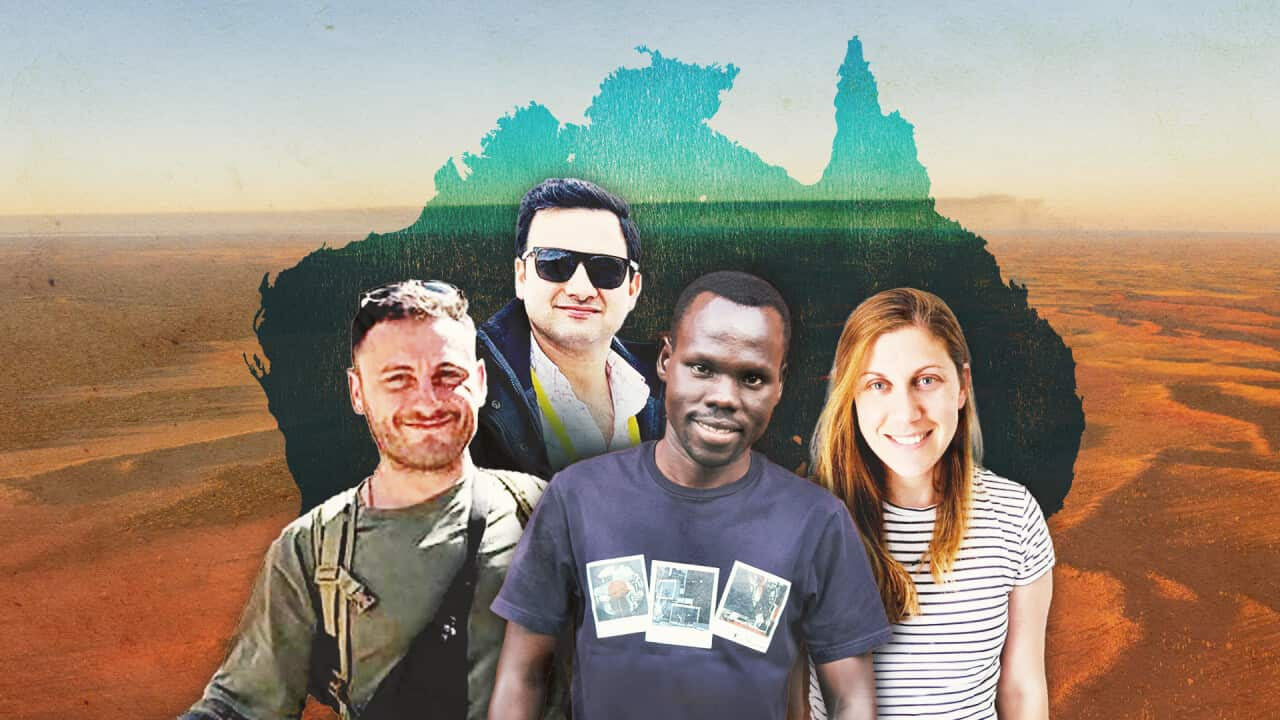Listen to Australian and world news, and follow trending topics with SBS News Podcasts.
TRANSCRIPT
Hundreds of thousands of displaced Gazans are heading south as Israel's bombardment of the enclave gets heavier and heavier.
Along a dusty road, said by Israel to be a safe route for 48 hours, Palestinian families push forward.
They carry what they can, the remnants of their lives in Gaza, to which they may never return.
Also being carried are children and the elderly, physically unable to make the trek.
Behind them the sounds of massive explosions as Gaza is levelled sector by sector.
According to Gaza's Health Ministry, 61 Palestinians were killed in the city on Wednesday, among them, a child and his mother, killed in an air attack on a residential apartment in the Shati refugee camp west of Gaza City.
UNICEF now says 26,000 Palestinian children require treatment for acute malnutrition, with more than 10,000 in Gaza City alone.
Many Palestinians say they have lost the will to live.
Among them, Abu Mohammed who has decided to stay put and face death.
“Where should I go? I am not leaving, where should I go? There is nowhere to go. Where should I go? There is no place, we are staying. If we are going to die, we will die here. They opened Wadi Gaza. At the end, where will you reach, where will you go? There’s no place, no land, no water, nothing. We leave it to God.”
As the Arab world grieves over what seems to be the loss of Gaza, Israel’s far-right finance minister says the seafront enclave could be a real estate bonanza.
Bezalel Smotrich says he is discussing with the Trump administration how the proceeds should be shared, as what he calls the demolition phase of Gaza continues.
(Laughing) I admit I didn't expect this. Just so you know it’s not funny. ... Listen to me carefully, there's a business plan set by the most professional people there is and is on President Trump's table, and how this thing turns into a real estate bonanza. ... We paid a lot of money for this war, so we need to divide how we make a percentage on the land marketing later in Gaza. And now, no kidding, we've done the demolition phase, which is always the first phase of urban renewal. Now we need to build, it's much cheaper.”
Mr Smotrich, a key ally in Prime Minister Benjamin Netanyahu’s governing coalition, wants to continue the war until Hamas is eradicated, relocate much of Gaza’s population to other countries through what they refer to as voluntary emigration and rebuild Jewish settlements that were dismantled in 2005.
Meanwhile, the European Union has unveiled its toughest measures yet against Israel over the Gaza war.
At a press conference in Brussels, EU foreign policy chief Kaja Kallas says the move is aimed at halting the humanitarian crisis.
She says the sanctions are not to punish Israel, but to improve conditions in Gaza, and she is calling for the release of all hostages.
"The aim is not to punish Israel. The aim is to improve the humanitarian situation in Gaza. All Member States agree that the situation in Gaza is untenable. The war needs to end. The suffering must stop and all hostages must be released. We must use all the tools we have towards this outcome. We must also not lose sight of the dangerous developments in the West Bank that reduce viability of a two-state solution.”
The package suspends trade concessions and freezes the European assets of 10 Hamas leaders, violent settlers, and two far-right Israeli ministers, National Security Minister Itamar Ben-Gvir and Finance Minister Bezalel Smotrich.
EU Trade Commissioner Maros Sefcovic explains how the measures would work.
"The proposed suspension targets tariff preferences granted to Israel, encompassing free movement of goods, right of establishment and supply of services, public procurement, competition and intellectual property. In practice, this means that imports from Israel to the EU will lose the preferential access to the EU market. And that these goods will be charged duties at the level applied to any other third countries with whom the EU has no free trade agreement. We regret having to take this step."
The European Commission also suspended A$57 million in bilateral funds.
But the proposal still needs backing from a majority of member states, and divisions remain.
This comes as hundreds of protesters gathered near Prime Minister Benjamin Netanyahu’s residence in Jerusalem.
Dressed in white and stained with red paint to symbolise blood, they demanded the government do more to bring home hostages still held in Gaza.
Among them was Machavit Mayer, the aunt of twins Gali and Ziv Berman, abducted in 2023.
Earlier this year, proof of life was provided indicating they are alive, being held separately.
There has been no update on them since.
"I pleaded, I flattered, I was diplomatic, I was aggressive, I prayed, and this is how all families fight. And where is this government? Why, amidst the extreme fear, the sadness, the prohibitions, do we have to fight a battle to save and bring back our loved ones?"
And Michel Iluz, whose son Guy's body remains in Gaza, accuses the Israeli prime minister of betrayal.
"We will fight for the return of our children and the restoration of the Israeli ethos. You will be with us here, we will set up a tent city here, everywhere here. We will sleep here, we will sleep here and stay here and make our voices heard before the prime minister, who betrayed us and the values on which we were raised."
Meanwhile in Tehran, Iran’s foreign ministry spokesman Esmail Baghaei is warning countries against normalising relations with Israel.
At his weekly briefing, he said closer ties with what he called a genocidal regime amounted to endorsing war crimes.
"Normalising relations with an occupying, genocidal, and terrorist regime means normalising crimes and aggression. That’s why we’ve warned all countries, especially those in the region, not to take steps toward establishing normal ties with this regime. Two years on, this has become a global public demand. We’re now witnessing many countries outside the Islamic world cutting trade and diplomatic ties with the Zionist regime. They’re doing so based on principles of international law, as well as religious, moral and humanitarian values. It’s expected that all countries reconsider their relations with the Zionist regime."
He accused the United States of complicity, noting that Israel’s latest offensive began during Secretary of State Marco Rubio’s visit to the region.
Mr Baghaei also praised this week’s summit in Qatar, where Arab and Islamic states condemned Israel’s strike on Hamas leaders in Doha last week.
Qatar has vowed to retaliate.
